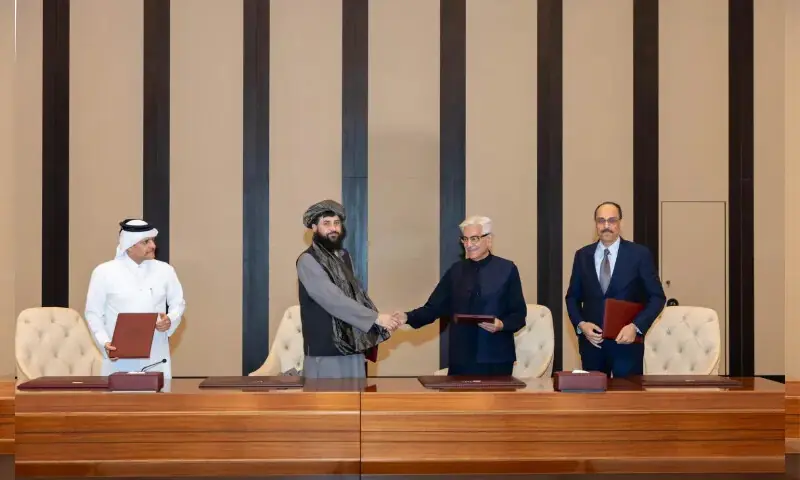Arshad Mahmood Awan
The Taliban government in Afghanistan has once again chosen confrontation over cooperation. Instead of honouring the commitments made under the Doha Accord of 2020, it has continued on a path of defiance. The agreement was meant to guarantee that Afghan soil would not be used for terrorism against any country. It also promised the protection of women’s rights and the formation of an inclusive government. Five years later, none of these promises have been fulfilled.
The Taliban’s refusal to deliver on these commitments has disappointed not only Afghanistan’s neighbours but also the wider international community. Mediation efforts by Turkiye and Qatar in Istanbul, and earlier the Moscow Format meetings, aimed to convince Kabul to take meaningful action against terrorist groups operating inside Afghanistan. Yet, these diplomatic attempts have failed to yield results. The situation now threatens the fragile balance of regional peace and economic cooperation.
In their latest move, the Taliban regime has directed Afghan traders to stop importing medicines from Pakistan and to find “alternative routes” within three months. This policy is not just a trade decision; it is a political message. For decades, Afghanistan’s economy has relied on Pakistan’s geography and trade routes. The Afghan Transit Trade has been a lifeline, allowing goods and essential supplies to move even during wars and sanctions. The Taliban’s attempt to cut this link shows a deepening hostility that could harm ordinary Afghans more than anyone else.
Pakistan has stood with Afghanistan through difficult times. It hosted millions of Afghan refugees, supported Afghan trade under global sanctions, and served as a transit route when few other nations offered help. Pakistan’s generosity and patience have remained unmatched in the region. Yet, the Taliban regime continues to harbour the Tehreek-e-Taliban Pakistan (TTP), whose militants attack Pakistani civilians and security forces. These groups act as proxies, destabilising Pakistan while Kabul turns a blind eye.
Such actions go beyond political differences. They show a reckless disregard for regional peace and a dangerous willingness to provoke conflict. The Taliban claim to seek stability, yet their decisions encourage violence and isolation. Shielding terrorist networks is not only a threat to Pakistan but also a danger to Afghanistan’s own future. The longer the Taliban allow militants to operate freely, the more isolated their country will become from global cooperation and development.
China, Russia, and Central Asian states have all stressed that economic progress cannot coexist with terrorism. Afghanistan’s geographical position gives it the potential to become a bridge for regional trade, linking South Asia to Central Asia and beyond. But that potential will remain unrealised as long as terrorism thrives on its soil. No country will invest in or trade through a nation that shelters groups threatening its neighbours.
The Taliban’s policies are also self-destructive. Economic isolation will worsen Afghanistan’s humanitarian crisis. Without trade and investment, unemployment will rise and poverty will deepen. The Taliban leadership may control Kabul, but they cannot control the hunger and frustration of a struggling population. Defiance without direction will eventually lead to collapse.
The elimination of terrorist sanctuaries in Afghanistan is essential for regional connectivity and peace. Projects like the China-Pakistan Economic Corridor (CPEC) and other transnational initiatives can only succeed in a secure environment. If terrorism persists, these opportunities will vanish. In the end, instability in Afghanistan and Pakistan serves only one actor in the region — India. A divided and insecure neighbourhood helps India advance its regional ambitions while others are caught in chaos.
The Taliban must realise that their defiance weakens Afghanistan’s sovereignty and dignity. True independence comes through peace, economic growth, and respect for international commitments. The choice before them is clear: remain isolated under the illusion of pride or join the community of nations through cooperation and reform. The world has shown patience. Now, Afghanistan must show responsibility.
















